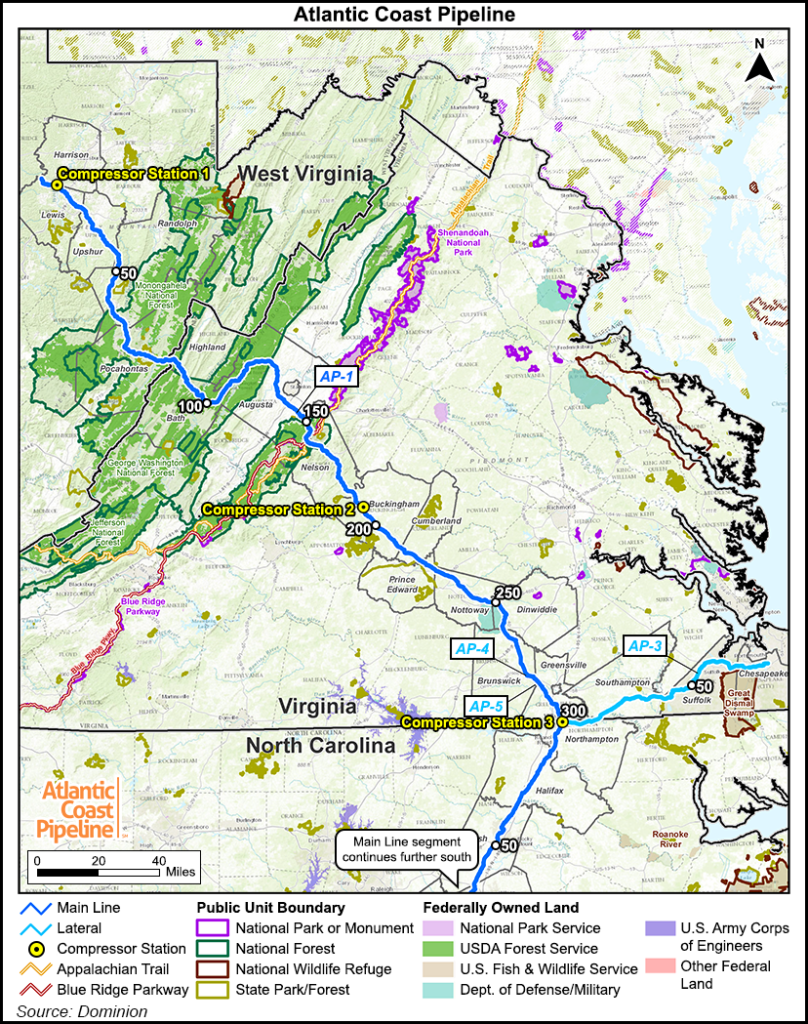Regulatory | Infrastructure | NGI All News Access | NGI The Weekly Gas Market Report
FERC Orders ACP to Stop All Construction
FERC late Friday ordered Atlantic Coast Pipeline LLC (ACP) to stop all work along the project’s 600-mile route in a move that was widely expected after a federal appeals court last week vacated key permits.

In its opinion, the U.S. Court of Appeals for the Fourth Circuit vacated a right-of-way (ROW) issued by the National Park Service (NPS) authorizing ACP to cross the Blue Ridge Parkway, which links the Shenandoah National Park in Virginia to the Great Smoky Mountains National Park in North Carolina, and provided more reasoning for an earlier decision to vacate an incidental take permit issued by the U.S. Fish and Wildlife Service (FWS).
The issues have been remanded to the respective federal agencies for revisions. The Federal Energy Regulatory Commission’s Terry Turpin, director of the Office of Energy Projects, said in a letter on Friday that there isn’t reason to believe that NPS and FWS won’t be able to comply properly with the court’s instructions in a timely manner. But without the necessary authorizations, work can’t continue, he said.
“Commission staff cannot predict when NPS or FWS may act or whether NPS will ultimately approve the same route,” Turpin said. “Should NPS authorize an alternative crossing location, Atlantic may need to revise substantial portions of the ACP route across non-federal or federal lands, possibly requiring further authorizations and environmental review. Accordingly, allowing continued construction poses the risk of expending substantial resources and substantially disturbing the environment by constructing facilities that ultimately might have to be relocated or abandoned.”
FERC instructed ACP to submit a plan to temporarily stabilize parts of the route during the work stoppage within five days of its order. It also gave the project three days to submit evidence that parts of the pipeline, such as the 37.5 mile Supply Header project in Pennsylvania and West Virginia, serve an independent public need.
“We will respond with strong evidence demonstrating the independent public need to proceed with construction of the Supply Header project, as well as portions of the Atlantic Coast Pipeline in West Virginia, eastern Virginia and North Carolina,” said ACP spokesperson Aaron Ruby, adding that the company is working with the federal agencies to avoid unnecessary delays. “These portions of the project will serve home heating and manufacturing needs in eastern Virginia and North Carolina and are not affected by recent court rulings.”
He reiterated that ACP has already provided the FWS with the information needed to revise the incidental take statement and management believes the agency will do so shortly. The permit is required for activities that could result in the take of, or negative impact to, threatened wildlife.
Prior to issuing the full opinion, the Fourth Circuit vacated ACP’s incidental take statement, forcing the company to stop work in May on about 100 miles of the system in West Virginia and Virginia. The court found that FWS failed to set adequate limitations on the harm the project might cause five threatened or endangered species.
In finalizing the ruling, the court also found that the NPS failed to explain how its approval of the ROW is consistent with its conservation duties under the Blue Ridge Parkway Organic Act. While project construction wouldn’t disturb the parkway’s ROW, as it would be installed beneath the surface, a 125-foot construction corridor would need to be cleared in what the court said would affect views from the parkway’s scenic overlooks.
Analysts cautioned that if new routes are required it could be problematic, as Republican Commissioner Robert Powelson left Friday to take on the role of CEO of the National Association of Water Companies, leaving FERC with just four members. Gridlock is now possible as two members of each party remain. Commissioners Richard Glick and Cheryl LaFleur are Democrats, and they’ve recently dissented on most new pipeline certificates.
Turpin’s letter to ACP came after FERC ordered the similarly-routed Mountain Valley Pipeline (MVP) to halt all work as well. In that case, the Fourth Circuit vacated decisions by the U.S. Forest Service and the Bureau of Land Management that allowed MVP to cross a 3.5 mile segment of the Jefferson National Forest in Virginia and West Virginia. MVP submitted its temporary work plan last week in response to that order.
Analysts added that the Commission does seem to be asserting more control over the situation as the projects face other legal challenges.
“We view these two FERC decisions to stop work entirely on both projects while permits are revised as an effort to retain as much control over the construction process as possible. Both stop work orders indicate that it is possible that the permits can be revised and the existing routes maintained, which we believe would represent the best-case scenario for both projects and the shortest construction delays,” ClearView Energy Partners LLC wrote in a note to clients. “Even if reroutes and additional processes wind up necessary, we believe that FERC’s control over construction restart could allow work to resume more quickly than if the courts grant stay requests.”
ACP would originate in West Virginia, pass through Virginia and into North Carolina to move 1.5 Bcf/d of Appalachian natural gas to the Southeast. The project, backed by Dominion Energy Inc., Duke Energy Corp., Piedmont Natural Gas and Southern Company Gas, is targeting a 2019 in-service date.
The 300-mile, 2 Bcf/d MVP would follow a similar path to serve the Southeast. The projects have faced criticism over those similarities and the potential environmental impacts two pipelines can create. Because of regulatory and legal issues, MVP’s target start date has already been pushed back by three months to 1Q2019.
© 2024 Natural Gas Intelligence. All rights reserved.
ISSN © 1532-1231 | ISSN © 2577-9877 | ISSN © 1532-1266 |
